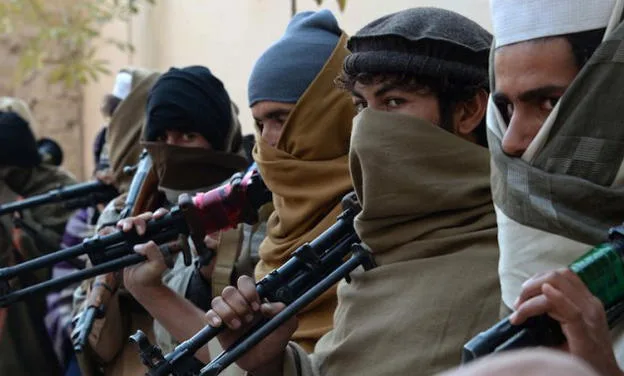Terror Threat Shifts to Nigeria, West African Coastline, US Warns
By Parrot Investigative Desk
2nd June 2025 | ISSN 3092-8435
NAIROBI, KENYA — The United States is sounding a fresh alarm over a dangerous expansion of extremist ambitions in West Africa, as intelligence suggests terrorist groups operating across the Sahel are now targeting the region’s strategic coastline—a development with far-reaching implications for security across the continent and beyond.
At a high-level press briefing during the African Chiefs of Defence Conference held in Nairobi from May 28–29, the Commander of the U.S. Africa Command (AFRICOM), General Michael Langley, confirmed that extremist groups linked to ISIS and Al-Qaeda are intensifying efforts to gain footholds in coastal nations like Ghana, Côte d’Ivoire, and Benin.
“The coastal infiltration of West Africa is not a hypothetical threat—it is an active objective of these groups,” Langley told African and international journalists. “If successful, it would transform their smuggling operations, escalate arms trafficking, and widen the scope of terrorist financing.”
Langley cited resurgent attacks in Nigeria, the Sahel, and the Lake Chad Basin as troubling indicators. According to the 2025 Global Terrorism Index by the Institute for Economics and Peace, the Sahel region accounted for 51% of all terrorism-related deaths worldwide in 2024—a startling rise from 48% the previous year. Five of the ten most terrorism-afflicted nations globally are in the Sahel, including Burkina Faso, Niger, and Mali, which remain hotbeds for insurgency.
Nigeria in the Crosshairs
Nigeria, already burdened by its battle against Boko Haram and the Islamic State West Africa Province (ISWAP), has found itself increasingly vulnerable. Langley confirmed that the US is maintaining strategic support for the Nigerian military, despite a partial withdrawal of American forces from parts of the continent.
“I visited Nigeria in November last year. We’re not stepping back from this fight—we’re evolving our partnerships,” he said. “Nigerian defence forces are some of the most capable in the region, and we continue to share intelligence, training, and support.”
Sources at the conference told Parrot Newspaper that while Nigeria remains committed to its counterterrorism efforts, internal challenges—ranging from corruption to underfunded intelligence services—continue to hamper progress.
Coastal Nations Brace for Impact
Coastal nations are now being urged to fortify their northern borders to prevent the southward spread of violence. “Ghana, Benin, and Côte d’Ivoire are on the frontline of a new phase in the regional security crisis,” Langley said. “Their success or failure will determine the future shape of terrorism in West Africa.”
In response, AFRICOM has intensified coordination with coastal militaries, focusing on early-warning systems, joint border operations, and training missions. Langley warned that failure to stem the tide at the coast could expose not only African nations, but also American strategic interests, including shipping lanes and diplomatic installations.
A Shift in Strategy
Langley’s statements reflected a more restrained US military posture, shaped by a desire to respect national sovereignty and reduce boots-on-ground deployments. “We don’t force partnerships. We go where we’re invited—and only when it aligns with US national security interests,” he said.
Yet, critics argue this hands-off approach may embolden terror networks in regions with fragile governance. A senior Nigerian military source, speaking to Parrot Newspaper on condition of anonymity, warned that “AFRICOM’s scaled-down visibility in West Africa is creating dangerous vacuum zones exploited by militants.”
Langley acknowledged these concerns, stating, “Yes, our footprint is smaller, but our commitment is unchanged. We’re doing more with less—leaning on intelligence sharing, joint training, and empowering African forces to take ownership of their security.”
Burkina Faso: A Diplomatic Gamble
Despite icy diplomatic ties, AFRICOM is still courting dialogue with Burkina Faso, whose military government has drifted toward non-Western alliances. “We invited Burkina Faso’s Chief of Defence to this conference because open channels are essential,” Langley said. “We don’t abandon diplomacy, especially when security hangs in the balance.”
East Africa and the Bigger Picture
In East Africa, Langley revealed an uptick in US-led operations against al-Shabaab in Somalia. “At Mogadishu’s request, we’ve carried out more than 25 airstrikes this year—double the number from last year,” he said. These operations, he noted, are part of a broader strategy to empower African militaries to “stand on their own.”
“African forces aren’t waiting to be saved. They’re confronting threats head-on, and that shift in ownership is crucial,” he added.
Peace Through Strength, Not Dependence
Langley’s message was unambiguous: AFRICOM’s future in Africa is about partnership, not patronage.
“We’re not here with handouts—we’re here with commitment. We want strong partners, not dependent ones,” he said. “A stable Africa is not a favour to the world. It is a strategic necessity.”
Military exercises across the continent, Langley said, are increasingly designed to improve interoperability, rapid crisis response, and institutional resilience. These goals, he stressed, require deeper engagement not just with armed forces, but with local communities and civilian authorities.
“The fight against terrorism must be won at the roots. That means tackling instability, inequality, and disillusionment—before they become radicalisation,” Langley concluded.
Terror Threat Shifts to Nigeria, West African Coastline, US Warns
As threats evolve, so too must the alliances. But with extremist networks seeking new fronts along West Africa’s fragile coast, the window for prevention may be closing fast.



